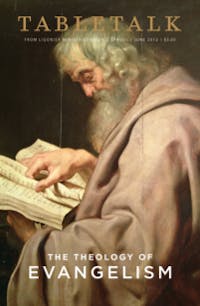
Request your free, three-month trial to Tabletalk magazine. You’ll receive the print issue monthly and gain immediate digital access to decades of archives. This trial is risk-free. No credit card required.
Try Tabletalk NowAlready receive Tabletalk magazine every month?
Verify your email address to gain unlimited access.
Psalm 66:18 states, “If I regard iniquity in my heart, the Lord will not hear.” In our present day, how often do we hear the truth that God does not hear the prayers of the unrighteous? In my personal voyage, I have very rarely, if ever, read a book or heard a sermon addressing this characteristic of prayer. Unfortunately, the evangelical church has become subject to the seeker-sensitive tactics that have drastic effects on the communication of the truths of God’s Word. A perfect example of this is a recent book on prayer that was No. 1 on the New York Times bestseller list for 35 weeks in 2001 and has sold more than 8 million copies. Most of us have seen this book, maybe even read it, but it fails to deliver the entire counsel of God.
It is truly unfortunate that the Christian culture has digressed so much in comparison to what it was even a few hundred years ago during the Puritan era. It is probable that the Puritans, as defined by the late Dr. John H. Gerstner, were some of the godliest men in the history of the church since the apostles. Their spiritual wisdom and application are rarely found in today’s pulpits, but thanks to Soli Deo Gloria Publications and other publishers, their sermons and other writings are still in print and available for our edification.
I do not think I would be off base in stating that prayer is difficult for all of us. I am constantly struggling to be diligent and consistent in my own prayer life. But in God’s glorious providence, I picked up a book recently that helped me rediscover the importance and the duty we have in having ceaseless communion with our heavenly Father.
The Puritans on Prayer is a compilation of sermons put together by three of the leading preachers of the Puritan era: John Preston, Nathaniel Vincent, and Samuel Lee. Within this single volume are found a plethora of Biblical insights, helping to define godly prayer, explain the purposes behind it, and apply Biblical wisdom to our prayer lives so as to make it edifying to our spirits and ultimately acceptable to the Lord. Truthfully, I have never seen so much helpful insight in one book.
This book is unique in that it communicates the character of true godly prayer as gleaned from the Scriptures. Preston, for instance, reminds us that prayer is our duty before God and declares, “He will have it done for His honor’s sake.” In everything we do, including prayer, our motivation should be the glory of God alone.
But how often are our times of prayer interrupted, delayed, or even cancelled for the sake of other “priorities”? Scripture warns us of this, stating, “But the end of all things is at hand; therefore be serious and watchful in your prayers” (1 Peter 4:7). In fear of falling into snares of the flesh and the devil, Vincent prescribes various medications, including “watching as a necessary ingredient.” In fact, Jesus advises us to be cautious even to the extent of entering into a closet and locking the door behind us to pray to the Father, who is in secret (Matt. 6:6). It is within these preliminary duties that God begins to enter into communion with us, and, according to Samuel Lee, “smell a sweet savor in the fragrant perfumes and odors of His intercession.”
I do not count it coincidence that Soli Deo Gloria Publications is devoted to the reprinting of the Puritans, whose ultimate concern was giving God the glory alone. Thanks be to God for leading Soli Deo Gloria to compile such volumes for the benefit of the entire kingdom of God.
